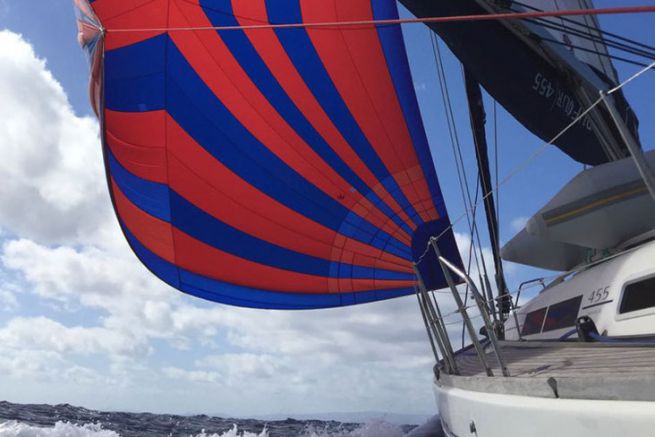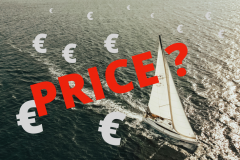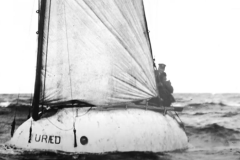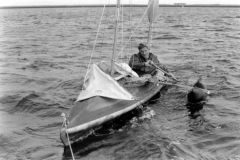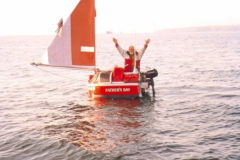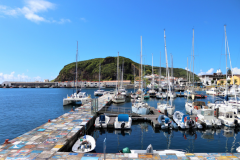The boat... Obviously a central subject in a family trip project. At the beginning of our project, we went through the ads, still believing that we would find the boat, pay for it and sail the galley with a snap of our fingers! This leads to highly unrealistic discussions such as" no less than 16 meters, otherwise it's much too small Luke Berry: "The Atlantic Challenge, a good opportunity to mix skills" a blue shell, it's still much more chic ". Every day we project ourselves on a different boat, every day different from the day before. All this without visiting a single one... Unconscious, I tell you. Moreover, we do not yet know exactly how much money we have available for this purchase.
Methods in research
We quickly understand that we have to put a little method into the process, otherwise we will turn like the fish in its jar and always stay at the same point. And the first step is to define our need.
We then make a decision that will prove to be one of the best in the project: we contact Lionel, Leopoldine's uncle and maritime expert on his state. He has a long experience in yachting: experienced sailor, former shipyard owner, sailboat rental company in Hyères, he knows the yacht market on the one hand, and all the technical aspects of recent and old boats on the other hand. He is one of those who can read the underside of the cards in a game where beginner's luck does not exist. To sum up, he is a real sailor, and what's more, a passionate sailor. We ask him to accompany us in the search and preparation of our boat. He kindly accepts, perhaps not knowing at that moment how much we will involve him in the entire technical preparation of our project.
Definition of the need
With it we are refining our needs: number of cabins, basic equipment, energy power, date of the standing rigging and so on. It makes us put our finger on the important elements: structure, rigging, plumbing, energy, where we wanted to talk about teak decks, tiller or helm or wheel and equipment. This first little shift has already, in part, put us back on the right track.
We quickly decide not to give in to the temptation to confront his advice with other experts. Not that we would not find other relevant opinions, but we are overwhelmed by the multiplicity of possible options.
An expert behind every passionate sailor
Whether they are experts in deep-sea navigation, experienced hikers, river fishermen or skilled tourists, all our contacts meet to give us their advice. Short or long draught? The self-proclaimed expert tells us peremptorily:" Long draught, of course! In the Mediterranean, the weather is capricious, the sailor is holding the wind tight. The long keel gives the sailboat stability in the breeze and power in the sea. Thirty centimeters apart... the size of a mackerel! "Another scientist succeeds him and contradicts him" Short draught, of course! You go for a fourteen thousand mile sail and Eole, if she is in a charitable mood, will push your boat with a downwind wind that will cause little drift. And if by any chance she's in a sad mood and sends you less favourable winds, what will the few miles of drift lost be worth? Shortly after the storm when you go to seek a deserved rest at anchor, the thirty centimetres will bring you closer to the coast several cables and give you better protection ". Not everyone attaches the same importance to about thirty centimetres...
Take responsibility for your decisions
What applies to the draught is infinitely replicable and applies to the multitude of choices we have to make. Watermaker or canisters? Heavy and powerful tender motor or not very powerful, but light? Going to the Transat of Cape Verde or the Canaries? Mainsail battened or furling? GPS plotter or portable tablet? Flat anchor or plough? Olives or anchovies? Pants or boxers? Everyone has an opinion on everything and if fate comes to confront two passionate people with opposing visions, the debates take the form of sleepless nights at the beach bistro counter. The important thing is not so much to make the right decision (often there is not only one) as to assume the one you make. By multiplying the advice, you don't save time, only migraines.
Then we define the budget of the boat ready to go, i.e. the amount covering the purchase and the upgrading work. We will come back to this in a topic to follow.
Good idea or preconceived idea?
At the same time, we read many articles, on forums dedicated to yachting, sites that bring together real scientists, so-called experts and ignorant fieffés, in an anonymity that does not encourage blind trust. We read on all possible subjects. And of course, we come out of our readings with a lot of certainties that, in reality, are mostly the ideas of people we know nothing about.
Here is an anecdote that came to me later: One day when we were walking with Lionel on the port of Sete after visiting a boat, I told him a foolishness like "I don't know what to do i don't want an aluminium shell ". He looks at me and asks me why. I kept quiet, not daring to tell him that it was not really my opinion, that it was the opinion of the contributors to the forum that I had flipped through the day before. He replies laconically to me you have very strong ideas sometimes. "I felt ridiculous and understood, not even trying to drop the few relevant arguments learned by heart. Beware of pre-formatted ideas and peremptory statements.
I understood that a used boat is not a Lego game, where you choose the color of the brick at each step. It is a whole already built, with which an architect has already played Lego in a learned alchemy. And several alchemies are possible, all with great advantages and minor disadvantages. We take both. The boats compare themselves in their entirety, not detail by detail.
The definition of our "ideal" boat
We orient our research according to the following criteria:
- Length of 45 feet minimum and at least eight berths. We will be six people on the boat, with occasionally one or two additional visitors, bringing the total crew to eight people for quite a long time. It is also important that those who wish to do so can isolate themselves a little, hence the importance of the number of cabins as well. Leopoldine rightly says that you have to be able to make a face for yourself. On the other hand, we do not want to have a boat too big for our wallet to support itself (berths, maintenance,...).
- Rigging in sloop or cutter, with a battened mainsail (not on furling), a genoa on furling. All this of course with recent sails. Having sailed mainly on regatta boats, I wanted to avoid the mainsail furling for performance reasons, unaware of its advantages in terms of ease of use, especially by an inexperienced crew. A staysail would really be a big advantage, but few boats are equipped with it. A spinnaker, symmetrical or asymmetrical, is almost essential: we will sail a lot under downwind conditions and the spinnaker will make us gain a lot of speed.
Many families have travelled the oceans on a ketch. This is not a "rational" reason that made us avoid this type of rigging, but a vague feeling associating (obviously wrongly) ketch with a multiplication of difficulties, a limited edition construction, and maintenance difficulties. In hindsight I just don't think we were ready. - In terms of equipment, nothing very original: the more equipment, the better.
- Energy: We want to have energy sources that can provide us with enough security and comfort. You don't go from the softness of a bourgeois house to the rustic sailor in a snap of your fingers. Generous solar panels and a high efficiency wind turbine are essential and will be mounted on a robust gantry. A hydrogen generator is a luxury that is probably beyond our reach, so a boat with such equipment would be a blessing. We also want a battery park with a capacity of 400 Ah (not yet knowing that we will decide later on to revise this minimum to 600 Ah).
- Survival of 10 people in good standing. It's a question of cost more than taste.
- And finally, a total budget of less than ?90k. In reality, our budget is slightly higher, but there will inevitably be additional costs.
Classified ads, a healthy reading!
From there, Léopoldine and I plunge into nautical classified ads and select boats that are likely to meet our needs. Then we visit the boats with our expert uncle. His vision allows him to define the approximate amount of work to be carried out to make it suitable for offshore navigation. By deducting the amount of the work from our overall budget, we get the purchase price we are willing to pay.
Among the models that best match our criteria are the Dufour 45 Classic, Dufour 455 Grand Large, Gib'Sea 472, Bavaria 44, Bavaria 49, Feeling 446, Oceanis 461 and 473, Sun Kiss 47, Sun Legende 44 and many others.
